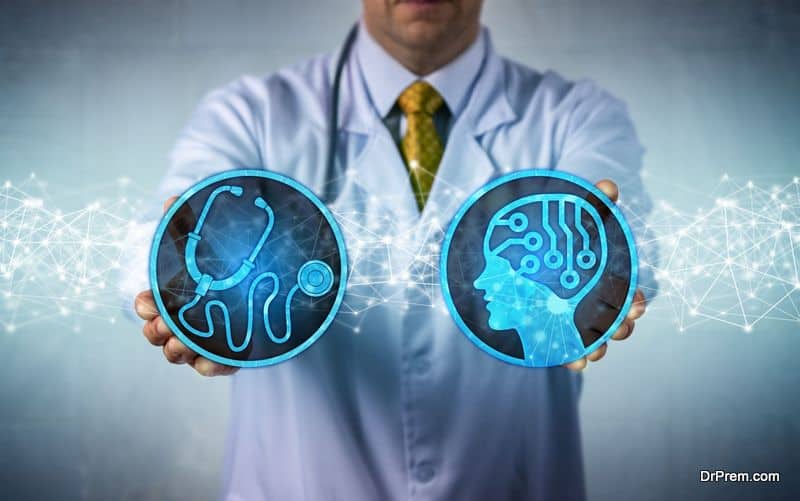The healthcare sector has always been in the forefront of innovation and technology. Since time immemorial, people have strived to achieve advancement in technology to improve human health and lifestyle. Artificial intelligence in the healthcare sector is revolutionizing the way we perform several tasks, from diagnosis of the disease to its treatment everything is seeing a rapid shift. It is changing the dynamics of the global healthcare sector. Much has been debated over the moral and ethical implications on the implementation of artificial intelligence in healthcare. Many experts and healthcare professionals were worried that the overuse of artificial intelligence might dehumanize healthcare.
As they say, we are in the very beginning of an era that will witness an explosion of innovation. The physicians’ burnout crisis is challenging the healthcare sector. Physicians are feeling overwhelming frustration and a loss of professional fulfillment due to various factors like the decline in efficiency and loss of autonomy.
How Artificial Intelligence Is Helping In Decreasing The Burnout Rate Of Doctors In Health Care Sector
-
Physicians admit of feeling burned out
-
5 interesting takeaways from the report
-
8 top ways AI can be applied for sophisticating the healthcare sector
-
Point of care learning
-
Clinical documentation:
-
Quality measurement reporting
-
Artificial intelligence can help doctors with better understanding of raw data
-
It can help with increasing physician satisfaction
-
AI can help with better patient and data management
-
AI can help with the burnout caused due to “hunt and search”
-
Doctors can predict the problem early
Physicians admit of feeling burned out:
But in striking contrast to the widespread fear of artificial intelligence posing moral and ethical threats, many doctors claim that the use of artificial intelligence has helped them with decreasing the burnout rate.
According to the survey conducted by the MIT Technology Review and Global Economic Healthcare: 80% of healthcare professionals claim that using artificial intelligence has helped with decreasing the burnout rate. The study surveyed more than 900 healthcare professionals in the US and the UK and asked them about the impact of artificial intelligence on their careers.
5 interesting takeaways from the report:
- 7 out of 10 healthcare professionals said they are planning to or have already adopted the technology for daily use.
- 50% of the professionals said that artificial intelligence has helped them spend more time with patients and give them more personalized care.
- About 80% of the respondents said that AI has been monumental in removing workplace barriers and employee burnout. It has helped with developing workflow improvement. Professionals with robust AI initiatives were discovered to spend 66% less time in writing reports when compared to their counterparts.
- Additionally, 70% of the surveyed professionals confessed that since the implementation of artificial intelligence technology, they have spent more time communicating to other staff members. This practice can ultimately lead to improvement in patient care quality.
- Many professionals claimed to have obtained immediate gains in implementing artificial intelligence technology. They have witnessed a reduction in the rate of clinical errors, half of the participants said that AI helped with improving diagnosis and will achieve in practicing deeper focus in preventive medicine.
Having seen many positive effects of using Artificial Intelligence doctors are realizing the benefits of leveraging the benefits of the technology. There are various ways doctors are using artificial intelligence to their advantage:
Artificial intelligence can be very useful for global healthcare professionals in several ways. It can help them to enhance their workflow and also help them in attaining higher job satisfaction and decrease their burnout. Many experts argue that the application of AI for physicians has far more realistic and helpful conclusion than any other solutions presented their way.
8 top ways AI can be applied for sophisticating the healthcare sector:
1. Point of care learning
Through the help of AI, physicians can receive information as and when clinical questions arise. AI can deliver personalized content that a physician may need by assessing practice data, data of online search queries, formal assessments, and self-completed assessments. This can save a lot of time for the physicians.
This way, physicians don’t have to waste time in reviewing things they already know. They don’t have to look through the content that is not critical or relevant to their case. This can make sure that the doctor doesn’t face any kind of information overload that can cause unnecessary confusion and stress.
To consider an example, patients with type I diabetes can track their glucose values with a pen. That pen can monitor the glucose level of that patient every minute. For a lot of physicians, it is difficult to interpret that data, but with the help of AI it gets easier to interpret the health condition of the patient.
2. Clinical documentation:
So much of a physician’s workload includes repetitive and tedious tasks. Doctors need to spend unnecessary amounts of time on legalities and documentation processes. This, however, is a very important process but it consumes a lot of the doctors time. Artificial intelligence can be employed for the task of clinical documentation.
Not only will it save time that doctors spend on legalities, it will also reduce the chances of error in the process. Using artificial intelligence for clinical documentation tasks is supposed to be one of the most promising applications of AI technology in the healthcare sector.
According to doctor Hodgkins and doctor Nundy, AI can have a really amazing and exciting future for clinical documentation. Experts propose the possibilities of AI programs that can actually analyze a free text narrative done by the physician extract relevant information and put it in the appropriate structured data. Studies have shown that artificial intelligence can help physicians reduce time that they spend on keyboard.
3. Quality measurement reporting
Clinicians spend more than 2.5 hours every week addressing quality measurement reporting according to various researches that were carried out in the field. With the help of AI, physicians can replace manual data collection. AI has the potential to pull out relevant information for quality reports by reviewing clinical documents. It will bring a level of accuracy and sophistication to the field that could be lacking due to manual reporting.
4. Artificial intelligence can help doctors with better understanding of raw data.
There is so much data in the EHR that humans have exceeded their limit of processing the data and make sense out of it. Artificial intelligence on the other hand is extremely efficient at identifying data patterns and determining which data and patterns are important to the outcome. Doctors can use AI technology to produce patient summaries.
With the help of AI, they can have relevant and important data, insights and potential interventions required for the patients in a concise and meaningful way. As physicians and patients interact, new information can present itself in real-time. With the help of artificial intelligence, doctors can easily decipher the information and evaluate its importance in decision making.
The AI tools can interpret and share any new insights that are derived from the conversation in real-time. This can drastically reduce the stress that doctors’ experience in the on-going practice and make them more confident for decision making.
5. It can help with increasing physician satisfaction
Artificial intelligence can enable us to improve physician’s workflow and it can simultaneously contribute to burnout relief and prevention. According to a survey by Stanford medicine, 62% of a physician’s time with a patient is spent in the EHR. With the help of AI, doctors can better concentrate on providing the highest quality care to their patients as they will be spending less time over the tedious task of data input and output.
The vision is becoming a reality where a doctor’s only concern lies in the treatment of its patients. Various inputs like microphone arrays, sensors, video and others are designed in order to observe patient- provider interactions. These encounters are then transcribed and correlated with sensor data.
Clinical concepts that hold importance are then extracted from transcribe and non-verbal cues are derived from the sensor data. Both together can provide supplement of information to aid in the process of diagnosis, etc.
6. AI can help with better patient and data management
According to Dr. Mark Lambrecht, the director of global health and life sciences department at SAS, California, we live in an age where a lot more data is generated than a physician can really analyze. With the ever expanding knowledge and increase in availability of data, it is difficult for doctors and physicians to keep track of every new research or discovery in the concerned field.
According to data in 2018, over 1.3 million papers were published on Medline. This amount of data makes it impossible for clinicians to be updated with the latest best practices. With the assistance of artificial technology, we can help doctors navigate through this problem efficiently. The possibility of AI tools to explore the literature can soon be used for indexing those papers and making appropriate clinical models. We can then match the longitudinal data sets to patients in real-time. When that information is made available to the doctors, it will enable them in making better decisions and increase their efficiency in patient management.
7. AI can help with the burnout caused due to “hunt and search”
Before the introduction of AI, the tedious tasks of going through the book and internet data and flipping through it to find the right information consumed too much time and caused too much stress. Consider this example, before AI radiologists would have to spend hours searching through books to find the x-ray that matched the patients x-ray to diagnose the problem. AI can scan through and find the perfect match within minutes thus drastically reducing the time required and eradicating the stress involved in the process.
8. Doctors can predict the problem early
AI can actually start understanding patterns and can help with detecting the symptoms early on. It can provide early warnings for conditions like seizures or sepsis. Getting ahead of chronic diseases is the goal of every healthcare professional. AI technology is finally allowing them to develop processes that will make proactive and predictive intervention possible.
Doctors will be able to harness the power of Smartphone and turn them into diagnostic tools. This will enable them to predict the early symptoms of certain diseases by just looking at their selfies various diseases at a very early stage. This will increase the chances of recovering from those diseases.
Leveraging the magical application of AI for clinical decision support, risk scoring, patient care, and early altering are few of the most promising areas of development. They will power a new generation of tools that will make clinicians more efficient, lead to better patient care and most likely take us ahead of developing problems. Artificial intelligence will enable a new era of clinical quality and exciting breakthrough in patient care. This will lead to a higher satisfaction in global healthcare professionals about their jobs and give them a chance to develop a better relationship with their patients.









